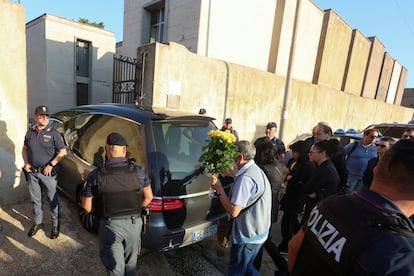The Italian mafia regroups after the death of capo Messina Denaro
The Cosa Nostra eschews headline-grabbing murders in favor of drug trafficking and corruption

Longtime boss Matteo Messina Denaro, who died in prison in late September, had become an elephant in the room for the Sicilian mafia. He was the last capo from a bloody era marked by bombings, public massacres and clan warfare. His high media profile drew dangerous attention to the Italian mafia, yet he still received help evading capture for three decades while managing operations until his arrest in January.
Things started to change in the Cosa Nostra when the legendary Messina was finally incarcerated in the L’Aquila maximum-security prison. After his death, doubts resurfaced about the current state of the historic Sicilian criminal organization. Now, it appears to be regrouping, intending to once again operate discreetly under the radar of authorities. However, Pasquale Angelosanto, the Carabinieri (Italy’s national police force) general who arrested Messina, warned that the organization is “alive and strong.”
Pietro Grasso, a former national anti-mafia prosecutor, has also warned that the Sicilian organization has entered a new phase, but remains active. “With the death of Matteo Messina Denaro, a life full of violence, conspiracies and mysteries comes to an end. A Cosa Nostra era also ends, but not the Cosa Nostra itself. The organization did not disappear after the deaths of Salvatore Totò Riina and Bernardo Provenzano, and it persists even today. The Cosa Nostra continues to change and evolve but remains the primary obstacle to a Sicily and an Italy free from violence, blackmail, and poverty,” he said.
Antonio Nicaso, an academic and author focusing on mafias, told EL PAÍS that the Cosa Nostra is currently undergoing a reorganization, leaving behind the violent era of attacks in the 1980s and 1990s on individuals and institutions by a Corleone clan led by Riina and top lieutenant Messina Denaro. “The Sicilian mafia is returning to its roots, resorting to violence only when absolutely necessary. The reign of the Corleone clan was an anomaly in the history of this criminal organization,” said Nicaso.
The Sicilian mafia is once again focusing on crime and corruption, as evidenced by recent seizures of large amounts of cocaine in Palermo and Catania. According Nicaso, an organized crime expert who advises governments and organizations, the Cosa Nostra is attempting to regain the ground it lost during its wave of violence in the 1990s. During this period, the ‘Ndrangheta (the Calabrian mafia) quietly became the most powerful and wealthy criminal organization in Italy, while the government focused on the Cosa Nostra.
“Now the Cosa Nostra is reestablishing its connections with politicians, government institutions, and the top echelons of the business and finance world. It’s more interested in making money and acquiring power than using violence and challenging the government,” said Nicaso, who also pointed out that mafias traditionally don’t directly challenge the government. “They attempt to infiltrate the economic framework, forging connections with politics and finance. This form of violence, rooted in corruption and power dynamics, proves challenging to identify and combat.” According to Nicaso, the mafia has consistently been a major economic force due to its involvement in international heroin trafficking and extensive global network of drug labs. Messina initiated the shift toward a business-oriented approach, which drew criticism from his mentor, Salvatore Totò Riina. Nicaso believes it’s too early to write off the Sicilian mafia, as it has a remarkable ability to adapt and regenerate.
Italian authorities are unsure of the exact details of the reorganization, but they acknowledge that the end of the mafia is still a distant goal. According to the latest report by the Anti-Mafia Directorate (DIA), the capture of Messina Denaro has weakened the organization and exacerbated the leadership issues it experienced after the deaths of Totò Riina in 2017 and Bernardo Provenzano in 2016. However, the report suggests that the organization’s operations in Sicily remain unaffected and are not expected to abate.
Messina had been Italy’s most wanted mafia boss since 1993 due to his involvement in hundreds of crimes, including the brutal attacks that led to the deaths of anti-mafia judges Giovanni Falcone and Paolo Borsellino in 1992. Last January, he was arrested in the Sicilian town of Campobello di Mazzara, near his hometown of Castelvetrano. He had been living a seemingly normal life with a fake identity, aided by a network of accomplices. Messina died in prison without showing any remorse for his crimes, taking all his secrets to the grave.

Italian investigators now know that Messina led a strong clan in the Province of Trapani (west coast of Sicily), a mafia stronghold. However, he didn’t hold the title of “boss of bosses” in Sicily, which is the highest position in the mafia hierarchy. Totò Riina, was the last such leader in a hierarchical structure that likely died with him. Still, Messina wielded tremendous power, and was an important figurehead for other crime families, says Angelosanto.
Maurizio De Lucia, Palermo’s chief prosecutor, believes that Messina was “a very important figure in mafia dynamics. As Totò Riina second-in-command, he was well aware of the organization’s rules and its many secrets, especially all the massacres in 1992 and 1993.” He stressed that only someone from Palermo would be allowed to lead all the Sicilian clans. Investigations reveal that Messina’s Trapani clan remains active. It has infiltrated the legitimate economy by corrupting politicians and businessmen, and continues to traffic drugs.
Sign up for our weekly newsletter to get more English-language news coverage from EL PAÍS USA Edition
Tu suscripción se está usando en otro dispositivo
¿Quieres añadir otro usuario a tu suscripción?
Si continúas leyendo en este dispositivo, no se podrá leer en el otro.
FlechaTu suscripción se está usando en otro dispositivo y solo puedes acceder a EL PAÍS desde un dispositivo a la vez.
Si quieres compartir tu cuenta, cambia tu suscripción a la modalidad Premium, así podrás añadir otro usuario. Cada uno accederá con su propia cuenta de email, lo que os permitirá personalizar vuestra experiencia en EL PAÍS.
¿Tienes una suscripción de empresa? Accede aquí para contratar más cuentas.
En el caso de no saber quién está usando tu cuenta, te recomendamos cambiar tu contraseña aquí.
Si decides continuar compartiendo tu cuenta, este mensaje se mostrará en tu dispositivo y en el de la otra persona que está usando tu cuenta de forma indefinida, afectando a tu experiencia de lectura. Puedes consultar aquí los términos y condiciones de la suscripción digital.









































